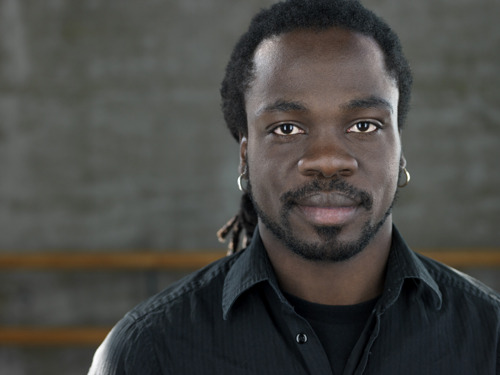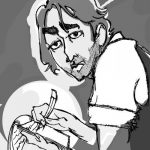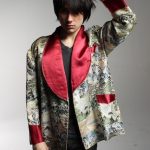Con Edison Immigrant Artist Program Newsletter, Issue No. 37
FEATURED ARTIST: MICHEL KOUAKOU
NYFA Program Associate Michon Ashmore interviewed dancer and choreographer Michel Kouakou, recipient of the 2012 Vilcek Prize for Creative Promise in the Arts, for the June newsletter.
For Michel Kouakou, becoming a dancer wasn’t a conscious decision, it was more a way of life. He grew up in Ivory Coast, a country rich in traditions of music and dance, where performance communicates emotion, celebrates rites of passage, and helps strengthen bonds between community members. “My country is a country of dancers so you grow up dancing all the time. It’s not something you make a choice about,” he said. “I never wanted to do anything other than dance.”
Kouakou’s commitment, passion and talent are helping him achieve noteworthy honors in the world of dance. The 31-year-old has received several fellowships, including one in 2007 from the New York Foundation for the Arts and one from the U.S./Japan Creative Artists Program, in 2008, which allowed him to study in Japan for six months. Earlier this year he was awarded the 2012 Vilcek Prize for Creative Promise in the Arts for his globally influenced performances and choreography. The $25,000 award, given by the Vilcek Foundation, honors the contributions of immigrant artists living in America who have distinguished themselves early in their careers.
Growing up in Abidjan, Kouakou experienced a difficult time making his way as a dancer. His father pushed him to play soccer and he found little support in his community. With no formal dance school, there were few places that offered instruction with contemporary performers. “In Africa, dance isn’t seen as a profession, so they don’t put much effort into training people,” he said. “The one place where I did receive formal training, they were building a bridge and so they tore it down. After that, most of my training involved hands-on collaboration with choreographers, traveling with them.”
As a youth, Kouakou was powerfully influenced by traditional village dances and would try to reenact them on his own. He also created urban-inflected dance routines with his friends and performed them in street competitions. At 15, he was discovered by the performer Werewere Liking and studied with her at Ki Yi M’Bock village before joining choreographer Germaine Acogny at l’Ecole de Sables, in Senegal. He fled Africa in 1999 as his country headed toward civil war to study in Europe and Japan. His travels and experience working with renowned choreographers, such as Bud Blumenthal and Kora Yamazaki, introduced him to new styles of dance and to the thought that he could make dancing a career. At 18, he said, “I started to believe more in dancing being my position because I was traveling, performing and taking classes with different choreographers. After I did my first piece in Germany, it opened my eyes and gave me hope that dance could be my work, my profession.”
Though his roots are based in traditional West African dance, Kouakou is known for taking a global approach to his art, drawing motivation from the countries he’s visited and his observations of culture and traditions in those places. “I work a lot with inner life and energy and I believe in connections, in what comes naturally,” he said. “I love Butoh dance and I feel close to Asian culture because when I was in Japan I saw a lot of similarities, like people eating rice in the morning. That’s something people do in my country. So that’s something I feel connected to, and I try to get to the essence of that.”
The desire to figure out his language and signature as a choreographer led him to establish Daara Dance Company in 2003. During the course of putting together different dance arrangements and working with other performers, Kouakou said he found the heart of his work. “By doing many different things you start to pay attention to what always comes, the reason why you’re doing your art. I started realizing that my pieces – not that they resemble each other – have the same center core. I found me in my work.”
Since 2003, Kouakou has performed with his company at New York’s Dance Theater Workshop, Joyce Soho, the Bates Dance Festival and the Los Angeles County Museum of Art. Internationally he has presented work in Britain, Chad, Cote d’Ivoire, the Czech Republic, France, Holland, Israel, and Italy.
As Kouakou continues to explore his own artistic journey, he also aims to pass along his knowledge and culture to a new generation of dancers. Currently he is training four young performers at Daara Dance, mentoring them and taking them along on his travels so they can see how he works. He has also taught at the University of California, Los Angeles since 2009. As he trains students there, he tries to help them find their own style and voice as dancers. “When it comes to dance, I tell them it’s about life,” he said. “It’s about what you feel inside as a person. I want them to bring their own background, to know what their needs and goals are and to channel their energy so that their dance is a reflection of their own lives. I want them to carry something instead of wearing something.”
For Kouakou, helping artists generate material and develop their ways of thinking and dancing is a lifelong career goal. With the $25,000 Vilcek Prize, he wants to move ahead with a plan to buy land in Ivory Coast to build an education studio so that dancers who want to learn from him can go there to train. He’s also trying to put together a dance festival in Abidjan in 2013 that will feature dancers from Congo, Benin, Senegal, and America. The award, he said, “is something that will help me begin to do these things but it’s just a start. When you’re going upstairs you don’t spend time on the first step, you just keep going. If you do stop on the first step, you’ll never get to the top.”
If you’d like to contribute to Daara Dance Company or find out more information about the Ivory Coast studio project, email Michel Kouakou at [email protected].





